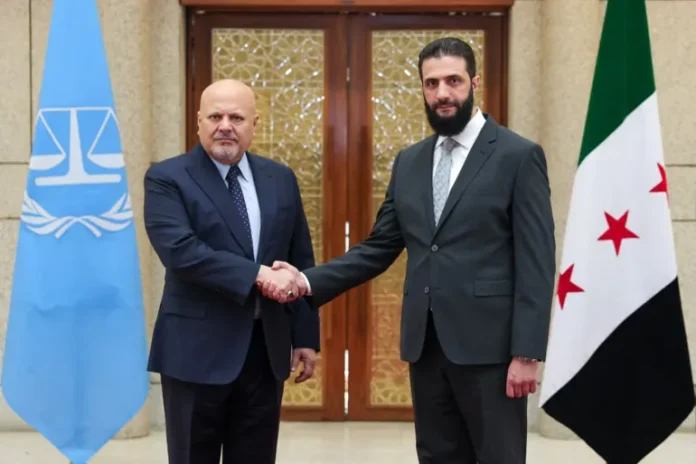Karim Khan, the Chief Prosecutor of the International Criminal Court (ICC), visited Damascus to meet Ahmad al-Sharaa, Syria’s newly-appointed leader. They discussed how to hold those responsible for war crimes and human rights abuses during the ongoing conflict.
The visit took place at the invitation of Syria’s transitional government. Khan, along with al-Sharaa and Syria’s foreign minister, explored ways to pursue justice for the victims of the civil war, which has caused over half a million deaths and displaced six million people.
Syria’s new leadership and Hayat Tahrir al-Sham’s role
Al-Sharaa now leads Syria’s new administration. He used to have links with al-Qaeda but ended his association with the group years ago. Al-Sharaa now heads Hayat Tahrir al-Sham (HTS), the group that played a pivotal role in bringing down Bashar al-Assad’s regime. While HTS was once a rebel group, it is now the dominant authority in Syria.
After more than two decades in power, Assad fled the country in December. His regime had a long history of repression. Rights organisations have reported that over 150,000 people disappeared following anti-government protests in 2011, many after being detained in Assad’s prisons. Many detainees died due to torture or poor conditions.
ICC jurisdiction and ongoing investigations into war crimes in Syria
Syria does not belong to the ICC, limiting the court’s authority to investigate crimes. In 2014, Russia and China blocked a referral in the UN Security Council that could have given the ICC jurisdiction.
The Organisation for the Prohibition of Chemical Weapons (OPCW) has confirmed that Syrian forces used chlorine gas and other banned chemicals in attacks on civilians. Both government and opposition groups have faced accusations of war crimes.
Khan’s visit followed a trip by the UN’s International, Impartial and Independent Mechanism for Syria, which visited Damascus last month. This mechanism helps gather evidence for future prosecutions. Robert Petit, its head, emphasised the importance of preserving crucial evidence before it is lost.
